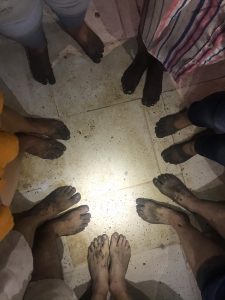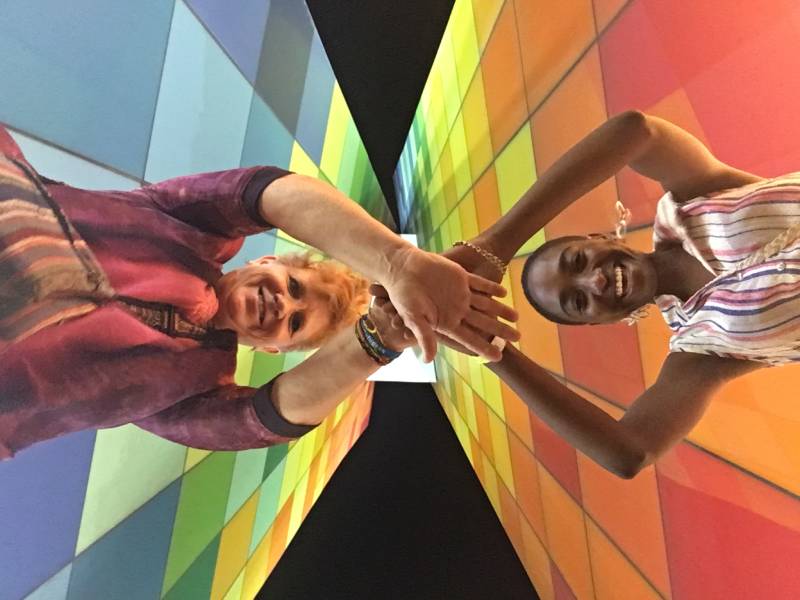
This is the first of a series of three reflections about the power of artful play as experienced in Colombia, Dominican Republic and Cuba, Feb. and March 2020.
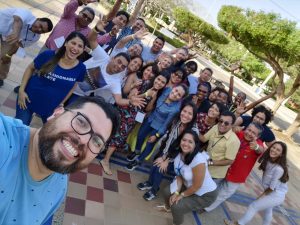
“‘My grace is sufficient for you, for my power is made perfect in weakness.’ Therefore, I will boast all the more gladly about my weaknesses, so that Christ’s power may rest on me. That is why, for Christ’s sake, I delight in weaknesses, in insults, in hardships, in persecutions, in difficulties. For when I am weak, then I am strong.”-II Corinthians 12:9-10
Imagine Dory’s whale impersonation from the film Finding Nemo: “Myliiiinda, Teee veeemoooos, teeee escuuuuchaaammooss, teeee hooonraaaammooos”- appreciation I heard at the end of the Training of Conflict Transformation Trainers in Barranquilla, Colombia Feb.2020
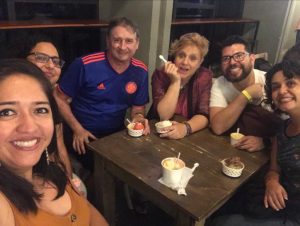
In these days of unprecedented anxiety, fear and uncertainty, to suggest that we play, may seem inappropriate and outright absurd. I would never suggest that we take suffering and pain lightly. However, I have experienced through artful play, the mystery of deep connection in spite of and in the midst of significant pain and loss. I am intrigued by the paradoxical promise of wholeness and healing embedded in and entwined with wounds and heartbreak.
How is it possible that when I recall my first time in Colombia, at a gathering of peacemakers from some of the most violent and dangerous contexts in the Americas (which includes the South, Central and Northern American continents plus the Caribbean island of Haiti) the sounds of animal voices, laughter, and singing is what first comes to mind? I was invited along with three other Conflict Transformation trainers by Tearfund to co-facilitate a weeklong peacebuilding through conflict transformation workshop with their Latin American partners. My co-facilitators came from Colombia, Mexico and the United States. The peacebuilders came from Guatemala, Haiti, Honduras, El Salvador, Nicaragua, Colombia, Argentina, Bolivia and Brazil. Each of us carried our own unique experiences and perspectives from diverse settings and cultures into this common space. As part of creating this shared space, each morning we did a welcome round to bring our names and bodies into the room. A well-loved ritual in many of the workshops I facilitate is the “We See you, We Hear You, and We Honor You” greeting. Each person introduces themselves, the group then says in Spanish, Te vemos, Te escuchamos,, Te honramos. The person then responds, “Estoy aquí” or I am here. This commitment to seeing, hearing and honoring our humanity in our differences, allowed us to create an experiential playground where we could bravely explore, engage, express, expand and extend our understandings. This brave, experimental space allowed us to meet each other in our struggles and in our silliness.
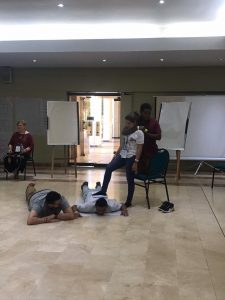
I noticed this on the day we were exploring self-limiting beliefs. While planning for the day, we began to share some of our own. We recognized that we all have them. They show up strongest right before we are about to do something significant. We hear internal voices telling us things like, “You’re not capable.” “You’re not enough.” “You’ll never follow through.” “Who do you think you are?” I mentioned using humor to befriend and disarm our inner critic’s negative power over us. In a weird way, this inner critic or self-limiting belief is trying to prote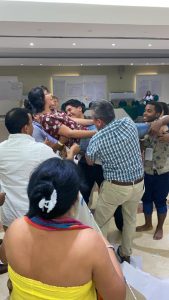 ct us from harm or embarrassment. If we could imagine our internal critic as a cartoon character speaking those negative thoughts out loud, it might help. My whale voice has shown up on a number of occasions, effectively bringing smiles and breaking the social ice. I imagined Dory, in her whale voice, telling me that I was too silly to be taken seriously in my doctoral studies. By honestly naming my fears in a way that invited laughter and resonance, I created a new and deeper emotional connection with my colleagues. They then felt freed up to share theirs with me as well. I realized that it was exactly in these playful, non-judgemental and humane ways, that a felt sense of safety happened, allowing us to form even deeper bonds. Through artful play, we met in the middle of our pain and a bit of healing came. We built a playful group culture on this rapport. In our welcome ritual that day, each participant was invited to share how they were feeling through an animal sound. My whale showed up again.
ct us from harm or embarrassment. If we could imagine our internal critic as a cartoon character speaking those negative thoughts out loud, it might help. My whale voice has shown up on a number of occasions, effectively bringing smiles and breaking the social ice. I imagined Dory, in her whale voice, telling me that I was too silly to be taken seriously in my doctoral studies. By honestly naming my fears in a way that invited laughter and resonance, I created a new and deeper emotional connection with my colleagues. They then felt freed up to share theirs with me as well. I realized that it was exactly in these playful, non-judgemental and humane ways, that a felt sense of safety happened, allowing us to form even deeper bonds. Through artful play, we met in the middle of our pain and a bit of healing came. We built a playful group culture on this rapport. In our welcome ritual that day, each participant was invited to share how they were feeling through an animal sound. My whale showed up again.
Eric Allen, in his writings, “Grateful by Nature” reflects on the nature of gratitude. I would say that I’ve experienced artful play as embodied gratitude. He posits, “The more that our gratitude is experienced through the many senses at once, the more deeply it resonates, and the more it persists. The more difficult the circumstances with which we’re faced, the more useful and essential gratitude is, to help us navigate turbulent days with grace.” By embodying gratitude through artful play (movement, rhythm, ritual, symbol, song, and games) we bypass the judgement centers of the brain. By bypassing judgement, we are more likely to feel safe, and the safer we feel, the freer we are to connect with others. Often it is our own self-judgement that keeps us from meaningful connections. Playing together helped us to befriend our self-judgement and find commonality in our shared and imperfect humanness. I’ve been exploring this idea with the following verse, to the tune of Singing in The Rain.
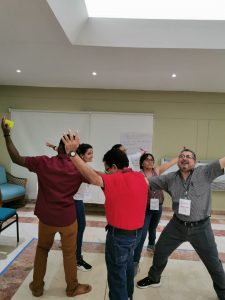
I’m playing in the pain
Just playing in the pain
What a peculiar feeling
I’m living again
Many of the participants of the February 2020 Training for Conflict Transformation Trainers in Colombia were going home to extremely challenging situations: political upheaval, armed conflict in their neighborhoods, economic and environmental devastation, immigration issues and a myriad of complex individual and community stressors. On top of these already existing vulnerabilities, the collective trauma of the COVID-19 pandemic is wreaking havoc now. I can’t pretend that playing together fixed any of these. I can say with confidence, that the connections that were formed and nurtured through artful exploration, serious silliness and sacred sharing on that experiential, peace waging playground during that week in February will help each of us navigate these turbulent days ahead. They will serve to remind us, though separated in space, we are in this together, we are not alone, we will live again.
Grateful for your companionship on the Way,
Mylinda